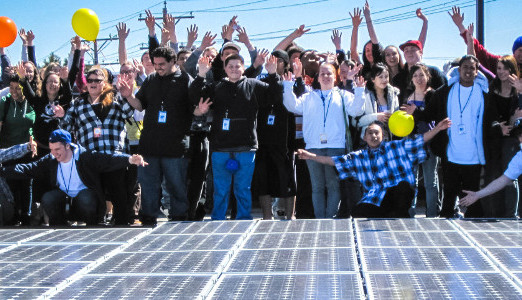Clean energy, by the people, for the people
May 05, 2017
on
on

The most obvious reason for switching to renewable energy sources is to offset climate change. The switch to new energy sources also offers a unique opportunity which is not often spoken about: the democratization of our energy supply.
This opportunity has arisen as a result of the change from fossil fuels to renewable energy sources. Our dwindling fossil fuel resources are concentrated in just a few countries such as Saudi Arabia, Russia and the US. Extraction is controlled by large companies such as Shell, Exxon and Gazprom and since energy fuels the global economy, these states and corporations wield enormous global power.
Energy from renewable sources however creates a totally different dynamic. The energy harvesting technology is freely available and we can now feed power from micro-generators into the mains grid. Any country or region can also independently decide to erect wind turbines or build solar PV farms. The energy supply network thus becomes decentralized without extreme power concentration.
Energy from renewable resources is also suitable for stand-alone small scale energy supply. Local government can use wind turbines or solar PV panels to supplement energy use in support of a carbon-neutral policy. As well as ecological benefits there are also economic advantages. Instead of paying faceless multinationals to supply the power, money remains in local cooperatives and companies, supporting jobs and providing economic growth.
Energy democratization is not simple but it’s possible, take for example Denmark and Germany; almost half of the renewable electrical generating capacity in Germany is owned by its citizens while In Denmark, more than 100 cooperatives own more than 75% of the wind turbines*. This is certainly an interesting development for an uncertain future. With the prospect of energy supply devolving to a network of smaller independent producers, you can be sure of one thing - the big hitters in the energy markets haven’t been sitting around twiddling their thumbs...
*According to 2013 figures
Picture: The NGO Black Rock Solar install PV panels on the Rainshadow Community Charter High School in Reno (Nevada). Photo: Black Rock Solar with CC BY 2.0 license.
This opportunity has arisen as a result of the change from fossil fuels to renewable energy sources. Our dwindling fossil fuel resources are concentrated in just a few countries such as Saudi Arabia, Russia and the US. Extraction is controlled by large companies such as Shell, Exxon and Gazprom and since energy fuels the global economy, these states and corporations wield enormous global power.
Energy from renewable sources however creates a totally different dynamic. The energy harvesting technology is freely available and we can now feed power from micro-generators into the mains grid. Any country or region can also independently decide to erect wind turbines or build solar PV farms. The energy supply network thus becomes decentralized without extreme power concentration.
Energy from renewable resources is also suitable for stand-alone small scale energy supply. Local government can use wind turbines or solar PV panels to supplement energy use in support of a carbon-neutral policy. As well as ecological benefits there are also economic advantages. Instead of paying faceless multinationals to supply the power, money remains in local cooperatives and companies, supporting jobs and providing economic growth.
Energy democratization is not simple but it’s possible, take for example Denmark and Germany; almost half of the renewable electrical generating capacity in Germany is owned by its citizens while In Denmark, more than 100 cooperatives own more than 75% of the wind turbines*. This is certainly an interesting development for an uncertain future. With the prospect of energy supply devolving to a network of smaller independent producers, you can be sure of one thing - the big hitters in the energy markets haven’t been sitting around twiddling their thumbs...
*According to 2013 figures
Picture: The NGO Black Rock Solar install PV panels on the Rainshadow Community Charter High School in Reno (Nevada). Photo: Black Rock Solar with CC BY 2.0 license.
Read full article
Hide full article

About Tessel Renzenbrink
Tessel Renzenbrink is a freelance writer with a focus on the impact of technology on society. She is especially interested in information technology and the transition to a low carbon energy system. For Elektor she is the editor of the columns Elektor Ethics a... >>



Discussion (0 comments)